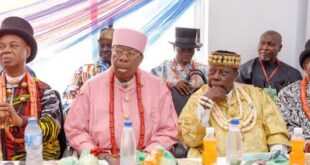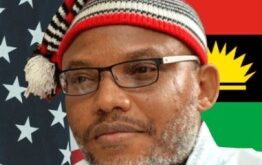By Young Erhiurhoro, Warri
The Igbe religion, generally, is the core African religion that came from God in the 18th century, through Prophet Ubiesha Etarakpo, an Urhobo man of Kokori descent, in present day Ethiope East Local Government Area of Delta State.
Today, this undefiled religion that came directly from the hands of Oghene (God Almighty) with a lump of white clay (holy chalk), which was according to their beliefs, the original dust as recorded in the Holy Bible that God used to create man in his own image (Genesis 1: 1 to end); is today a big pride and glory to the Urhobo nation since it has spread across many African countries like Ghana, South Africa, Tanzania, Ivory Coast etc and the European countries like the United Kingdom. What about the American continent, it was also reported that a branch of the Igbe religion was established in the United States in the 60s, even till today. Back home in Nigeria here, we have thousands of Igbe branches all over the country. In Delta state, the home and host state, the religion is practiced in virtually all the tribes in the state. I think, this is worthy of celebration by the Urhobo people for the religion to put us in the world map.
Generally, their terms of beliefs, practices and symbols of identity are belief in purity and holiness of body and spirit, belief in the existence of the spirit, belief in forgiveness of sins, belief in life after death, belief in ancestral worship, belief in paradise on earth, belief in the existence of heaven as abode of God Almighty and his angels and many other beliefs. The Igbe practices include worshipping in the holy hall, solemn days of worship, singing and dancing, making vows by members/non-members, baptismal/purification practices with the African palm wine or soft drinks (holy water), confession of sins, individual/group prayers, solemn feast, holy festivals etc. While their symbols of identity include white clothing, circlical hand fan made from cattle’s hide, white tiny rope made from the white clothing worn on hands and neck etc.
However, the area I want us to look here today is the efficacy and miraculous powers in the holy chalk called Orhe Ofuafo in Urhobo language which is the symbol of worship in the Igbe religion. And I want us to look at it from the Igbe Orhe Ofuafo Oghene Healing Home Inc which was established in 1975 by late Uku Sunday Efedudu. The man was ordained Uku which is the highest religious position in the Igbe religion today after the Uku Supreme which is the sole right of the children of the founder, Prophet Ubiesha Etarakpo. Late Uku Sunday Efedudu was ordained Uku in 1975 which is equivalent of a church bishop by the late Uku Supreme Ibodje Ubiesha at Unenurhie town, Evwreni kingdom in Ughelli North LGA of Delta state. He registered his own Igbe with the Corporate Affairs Commission (CAC) with the name of Igbe Orhe Ofuafo Oghene Healing Home in 2010.
Factually, since the establishment of this Igbe religion in Unenurhie town by this revered man of God and religious leader, so many miracles were attributed to the power and efficacy of the holy chalk and also shared as testimonies by many members of the religious group from Urhobo, Isoko, Ijaw, Itsekiri, Ukwani, Benin, Ndoma etc. In fact, late Uku Sunday Efedudu was a household name around the Niger Delta region in his time. The name was heard everywhere as a prophet and a great healer of different diseases and incurable sicknesses with just the holy chalk. The writer of this piece is a living and practical witness to some of these miracles.
For instance, my biological mother, late Mrs. Comfort Atori, nee Oserada was infested with epilepsy immediately after my birth. According to the story my mother confided in me before she died, she was taken to different healing and herbal homes for treatment, but all was to no avail, until around 1983, when a family friend to my mother who was a member of the religious group directed my mother’s family members to bring her there. That was what took my mother to Unenurhie town and she truly got her healing and salvation immediately she was made to confess her sins and baptized to be a full member of the traditional religion. I later joined my mother at Unenurhie in 1986 during the Uwheru civil unrest. This is just one of many miraculous healings in the Igbe religion. There are countless numbers I can’t mention now.
More importantly, the subject matter of this piece is the construction of the first Patani bridge in 1981. The Patani bridge which is today constructed across the Patani river runs from Warri river through Nembe river, all in the Niger river. Patani is a riverine community in the present day Patani LGA in Delta State. It’s glaringly to note that the community is also the headquarters of the local government council. The east/west road construction from Benin to Patani (first phase) as a federal road project was awarded then to Dumez Construction Company by the then Alhaji Shehu Shagari’s administration in 1979. Whereas the Patani bridge was separately awarded to a giant bridge construction company called Strabag. Then, it was a single lane federal carriage way.
The said construction company started the bridge project by first erecting steel pipes in the river. To their uttermost amazement, the trained engineers of the construction company were surprised when they saw the steel pipes driven deep to the ground with their heavy machines by the river bank the following morning. It was a great surprise to the white engineers. They carried the steel pipes again with their machines and hit them hard to the hardest part of ground as usual. In the following morning, all the steel pipes were again seen by the river bank. The company engineers tried this for many times, but they couldn’t have their way as expected.
In this baffling situation, the company management now embarked on both technological research and spiritual findings to know the root cause of pulling out the steel pipes every time they were laid. It was here they now discovered that there was a very powerful water deity in that particular spot of the river where they wanted to construct the bridge across. Then, if that is true as part of African beliefs, how do they now overcome the technological challenge to still maintain their proficiency, efficiency and integrity as an international reputable bridge constructors?
This was when Strabag Construction Company began to move from one herbal or religious home in Nigeria here and abroad to another in search of solution to their technological shortfall. They did this for many times without finding the solution as such. Africans being the blacks they were, even extorted the engineers and company management of huge sums of money by giving them fake prophecies and solutions. However, after a long search for solution to no avail, it was there a Patani young man who was paternally related to Uku Sunday Efedudu named Friday Governor and who was also close to the CLO team of the construction company told the engineers that there was a powerful religious home in a community called Unenurhie, which was few kilometers from Patani. He convinced the white men that the man could solve their problem based on the miraculous powers he had.
As it can happen to anybody in search of peace, comfort and success in life, the Strabag engineers never hesitated much before they accompanied Mr. Friday Governor to the Igbe Orhe Ofuafo Oghene Healing Home Inc at Unenurhie town for solution to end the pulling out of steel pipes from the river. Truly, when they came, the prophets in the Igbe religion known as ‘Edjobo’ in Urhobo language welcomed them as in other religious homes before with the same prophetic declarations that a marine deity was responsible for their challenge. To them, the cause was already known. But how will they get the solution to the problem was the only question in their mouths.
Uku Sunday Efedudu who established the Igbe religion in the locality asked them to make a vow before Orise, the Almighty God. The Strabag engineers did without hesitation. It was here Uku Sunday Efedudu gave a piece of the holy chalk and a bottle of the holy water to two of his renowned prophets at that time called Olori Smart Onovuikpe and Soldier Onuvworoma to pray with the holy chalk and then sprinkle the holy water across the river. This what the two prophets did under the watchful eyes of the said Strabag engineers and Mr. Friday Governor at the time they all got to the said river.
Immediately after few days of offering the prayers inside the river, Strabag again brought their machines and started erecting the steel pipes as usual. They successfully erected the steel pipes but were still afraid. But to God be the glory, the steel pipes remained untouched and there was no pulling down as before. Yet, the Strabag engineers were not convinced. They thought they were in a dream, and still gave more few days to convince them of the efficacy of those prayers by the Igbe prophets through their spiritual leader. For all those days, the steel pipes remained the same without a little bend.
Interestingly, it was here the Strabag engineers and every other person around, including those that first tried to no avail were convinced beyond doubt that truly, there was divine powers in the ordinary lump of clay as ordinary people would see it. And until the company successfully completed the bridge project in 1981, there was no noise again as related to water or marine deity disturbing their pace of work. Secondly, there was no industrial accident that claimed the lives of workers while in site or at home during the construction period. It was really a ground breaking miracle by Igbe Orhe Ofuafo Oghene Healing Home Inc at that time when the rise of Pentecostalism was still a mirage in Nigeria.
However, to pay their vows as made by the company directors and engineers, after completing the bridge in 1981, the representatives of the company visited the Igbe Orhe Ofuafo Oghene Healing Home Inc at Unenurhie town in March 25 during the celebration of the holy annual festival or convocation of the Igbe religion. After paying the cash vows as the religious practices demanded, they also presented an iron constructed plaque to Uku Sunday Efedudu to make the visit more remarkable and historical. Not only that, they were also initiated and baptized with their families to become full members of the Igbe religious group. This was their religion in Nigeria until they finished all their projects here and left the shores of the country. In all those times, even as a child, I saw them visiting especially during holy festivals with homages and thanksgivings to the Uku in charge. In fact, I wrote this short piece to protect and secure this historical and remarkable record for future reference especially for those religious fanatics that called themselves Christians that castigate the Igbe religion as satanic religion. But the bitter truth is that, the same way we have different churches across the globe, is also the same with the Igbe religion, even though it’s still classified among African traditional religions (ATRs).
Young Erhiurhoro; Kjc is a reporter and a member of the Urhobo Historical Society.
 PH Mundial – Port Harcourt Online Newspaper News Across The Region
PH Mundial – Port Harcourt Online Newspaper News Across The Region





